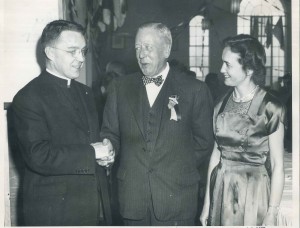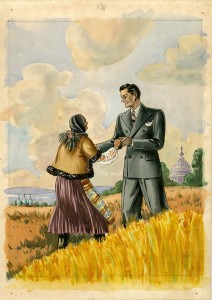
Among the archival collections housed at The Catholic University of America (CUA) are the papers of Bruce Monroe Mohler (1881-1967) and Dorothy Abts Mohler (1908-2000), two of the most remarkable people ever produced by the American Catholic Church. Both epitomized the active participation of the laity as each contributed a lifetime of humanitarian service in regard to the crucial issues of immigration (Bruce) and charity (Dorothy). In addition to this legacy of service to their Church, they not only left their aforementioned papers but also a stupendous financial bequest to the CUA Archives to collect and safeguard archival collections to promote the study of American Catholic history.
Bruce Mohler was an Ohio native and graduate of Ohio State University who worked for the Minnesota State Board of Health supervising sanitary conditions of public drinking water until released in 1918 to serve in the American Expeditionary Forces (AEF) in the First World War. As an army major in France, he was in charge of engineers purifying drinking water for the troops. After the armistice, he was the army representative to the American Red Cross relief effort in Poland and after de-mobilization was Deputy Commissioner of the American Red Cross in Poland. As conflict raged between Poland and Bolshevik Russia, he heroically took a relief unit to the war torn city of Kiev, earning accolades for his efforts from both Poland and the United States.

Returning to the United States, Mohler served 1920-1965 as the first director of the Bureau (later Department) of Immigration of the National Catholic Welfare Council (today’s United States Conference of Catholic Bishops), formed to protect the faith of Catholic immigrants while handling cases pertaining to immigration, deportation, naturalization, and citizenship. He pragmatically set up offices in New York, El Paso, and Washington, with resources in close proximity to Ellis Island, Mexican immigrants, and Congress, respectively. During World War II, he went to Europe as a member of the War Relief Services (later Catholic Relief Services), where he established relief programs for civilian refugees. Mohler was eulogized in 1967 for his tireless work ethic and devotion to duty in helping hundreds of thousands of Catholic Immigrants find safe refuge in the United States.
In 1949, Mohler married Nebraska native Dorothy Abts in a service officiated by Apostolic Delegate Archbishop Amleto Giovanni Cicognani. Dorothy, who had earned advanced degrees in Sociology at CUA under the renowned Msgr. Paul Hanly Furfey, was both a social worker and long time faculty member at the National Catholic School of Social Service (NCSSS).

Like all Americans, Dorothy was shocked by the November 22, 1963 assassination of the first Roman Catholic President of the U.S., John F. Kennedy. She poured out her thoughts and feelings that same day in an amazing document written in her NCSSS office in Shahan Hall, musing that JFK was shot because of “his stand for civil rights for the Negro.”
She was also a long-time advocate of the need for American Catholic institutions, especially those devoted to social justice, to preserve their documentary heritage by archiving their records, In addition to donating their money and papers to CUA, Dr. Mohler facilitated the donation of records from several important Catholic organizations such as Catholic Charities USA and the Christ Child Society. The Dorothy Mohler Research Grants are named in her honor. For more on the collecting process see the‘More Than You Imagine: The Archives at CUA’ blog post.
